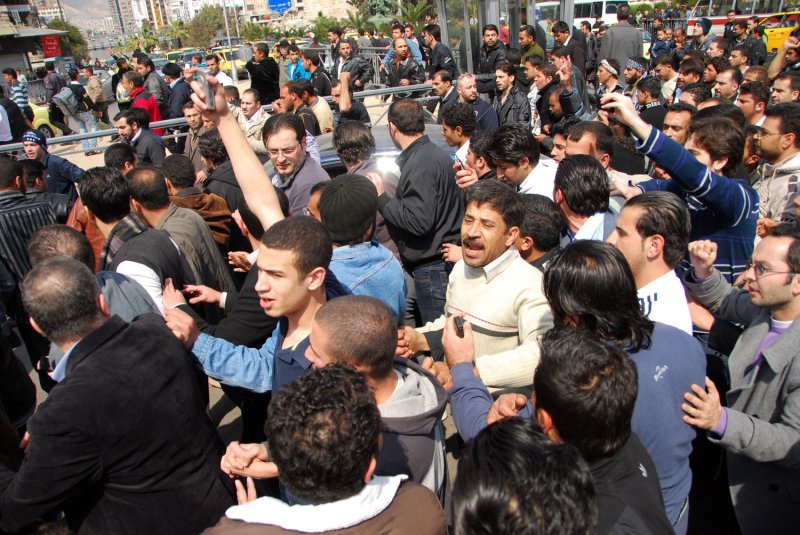Syrian anti-government protesters shout slogans during a demonstration at Souk Al-Hamadiyeh street on Friday, March 25, 2011, after Friday prayers at Omayyed mosque in the center of Damascus Old City in Syria. Hundreds of Syrians protesters chanted slogans calling for the ouster of Syrian President Bashar al-Assad. UPI/Ali Bitar |
License Photo
CAIRO, April 1 (UPI) -- Syrian President Bashar Assad is struggling to contain spreading unrest that threatens his regime by dangling the prospect of political reform but the crisis goes deeper than that.
Damascus has for years been grappling, unsuccessfully, with a crippling water shortage that analysts say threatens the entire region.
It was no coincidence the upheaval in Syria that began two weeks ago amid unprecedented political turmoil across the entire Arab world flared first in the town of Daraa in the country's drought-ridden south.
Daraa is one of Syria's poorest towns, jammed with large numbers of people made destitute by the water crisis and long-neglected.
"Syria faces an unprecedented water crisis, compounded by poor agricultural infrastructure and management," observed Middle East analyst Victor Kotsev.
But these have been chronic problems across the Arab world for decades, largely because of inept governance by the very authoritarian regimes now wrestling with pro-democracy uprisings.
"There is a twist also to the geopolitical ramifications of what is happening," Kotsev warned.
"If it develops much further, the unrest could theoretically destabilize the entire region in a more profound way than any other regional crisis."
In this context, Daraa becomes the template of the turbulence sweeping the region and which shows no sign of abating.
The presidents of Egypt and Tunisia have already been toppled. Three others teeter on the brink: Moammar Gadhafi of Libya, Ali Abdullah Saleh of Yemen -- whose country is actually running out of water -- and Assad.
In part, at least, the problem of high food prices is a consequence of the business elites allowed to prosper by Arab rulers to buttress their regimes, and which eventually control food and other commodities to their own enrichment.
"What are essentially dictatorships like Syria rule through corruption," observed David P. Goldman writing in Asia Times Online's Spengler column March 29.
"It is not an incidental fact of life, but the primary means of maintaining loyalty to the regime."
Goldman, a noted U.S. economist and author, said, "The Arab bazaar speculates in foodstuffs as aggressively as hedge funds, and the Syrian government's attempt in February to keep food prices down prompted local merchants to hoard commodities with a long shelf life."
Syria has had water problems for years, not just because of poor agricultural performance, economic planning and rapid population growth.
Israel's seizure of the Golan Heights, a strategic plateau in southern Syria, in the 1967 war cut Syria off from a major aquifer that now feeds the Jewish state along with water sources in still-occupied Palestinian West Bank.
That was compounded by Turkey's decision in the early 1980s to build giant dams on the Euphrates River, a key source of water for Syria, its southern neighbor, across impoverished southeastern Anatolia.
The water flow of the Tigris River, too, was cut by the Turkish program for 22 dams, causing a severe reduction in water supplies in Iraq, through which the Euphrates also runs.
The rivers converge in southern Iraq and form the Shatt al-Arab waterway that flows into the Persian Gulf.
The drought began six years ago and has seriously eroded Syria's already reduced water supply, as it has elsewhere in the region. Unregulated well-digging has made things worse in Syria, drying up rivers and springs.
Amid the current political turmoil, Arab governments have been buying food supplies in large quantities in a bid to contain or avert the political whirlwind. This is a stopgap solution at best that doesn't address the fundamental causes of the uprisings threatening a dozen or more regimes.
The Syrian upheaval, the worst there in 30 years, was late in starting but it's continuing despite a harsh response by Damascus in which scores of protesters have reportedly been killed by army gunfire.
With the region's food production suffering, imports are climbing -- and becoming more expensive, making it more problematic for embattled regimes to wriggle out of the current convulsions that threaten them.
The U.N. Food and Agricultural Organization warned Feb. 3 that global food prices were at an all-time high due to climate change and poor harvests in key grain exporters like Russia and Ukraine.
Escalating food prices may not have been the primary force behind the current turbulence but they may soon become so.















